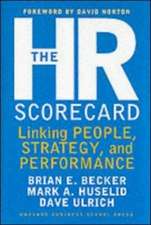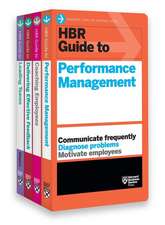Key MBA Models
Autor Julian Birkinshaw, Ken Marken Limba Engleză Paperback – 21 mai 2015
Preț: 246.58 lei
Nou
Puncte Express: 370
Preț estimativ în valută:
47.19€ • 51.24$ • 39.64£
47.19€ • 51.24$ • 39.64£
Carte disponibilă
Livrare economică 01-15 aprilie
Livrare express 18-22 martie pentru 29.93 lei
Preluare comenzi: 021 569.72.76
Specificații
ISBN-13: 9781292016856
ISBN-10: 129201685X
Pagini: 296
Dimensiuni: 156 x 233 x 20 mm
Greutate: 0.45 kg
Editura: Pearson Education
ISBN-10: 129201685X
Pagini: 296
Dimensiuni: 156 x 233 x 20 mm
Greutate: 0.45 kg
Editura: Pearson Education
Cuprins
- PART ONE ORGANISATIONAL BEHAVIOUR
- 1 Change management: Kotter’s eight-step model
- 2 Cognitive biases in decision making
- 3 Emotional intelligence
- 4 Managing work groups: Belbin team roles
- 5 Matrix management
- 6 Mintzberg’s managerial roles
- 7 Motivation: Theory X and Theory Y
- 8 Negotiating techniques: BATNA
- 9 Schein’s model of organisational culture
- 10 360-degree assessment
- PART TWO MARKETING
- 11 Customer lifetime value
- 12 Ethnographic market research
- 13 Market orientation
- 14 Multichannel marketing
- 15 Met promoter score
- 16 The 4Ps of marketing
- 17 Pricing strategies: dynamic pricing
- 18 Product life cycle
- 19 Segmentation and personalised marketing
- PART THREE STRATEGY AND ORGANISATION
- 20 The ambidextrous organization
- 21 The BCG growth-share matrix
- 22 Blue ocean strategy
- 23 Core competence and the resource-based view
- 24 Corporate social responsibility: the triple bottom line
- 25 Corporate strategy: parenting advantage
- 26 Five forces analysis
- 27 Game theory: the prisoner’s dilemma
- 28 Generic strategies
- 29 The McKinsey 7S framework
- PART FOUR INNOVATION AND ENTREPRENEURSHIP
- 30 Brainstorming
- 31 Design thinking
- 32 Disruptive innovation
- 33 Greiner’s growth model
- 34 Open innovation
- 35 The seven domains assessment model for entrepreneurs
- 36 Stage/gate model for new product development
- 37 Scenario planning
- PART FIVE ACCOUNTING
- 38 The accrual method in accounting
- 39 Activity-based costing
- 40 The balanced scorecard
- 41 The DuPont identity
- 42 Economic value added
- 43 Ratio analysis
- PART SIX FINANCE
- 44 Black-Scholes options pricing model
- 45 Bond valuation
- 46 Capital asset pricing model
- 47 Capital budgeting
- 48 Modern portfolio theory
- 49 Modigliani-Miller theorem
- 50 Time value of money
- 51 Valuing the firm
- 52 Weighted average cost of capital
- PART SEVEN OPERATIONS
- 53 Agile development
- 54






















